- Home
- James S. A. Corey
Caliban;s war e-2 Page 2
Caliban;s war e-2 Read online
Page 2
Hillman pushed to his feet. Bobbie flexed her knee once and got greens on her diagnostic. She gave Hilly a nod of thanks, then said, “Double-time it back to the outpost. Go.”
Bobbie and her squad were still half a kilometer from the outpost when the general alert went out. Her suit’s HUD came up on its own, switching to combat mode. The sensor package went to work looking for hostiles and linked up to one of the satellites for a top-down view. She felt the click as the gun built into the suit’s right arm switched to free-fire mode.
A thousand alarms would be sounding if an orbital bombardment had begun, but she couldn’t help looking up at the sky anyway. No flashes or missile trails. Nothing but Jupiter’s bulk.
Bobbie took off for the outpost in a long, loping run. Her squad followed without a word. A person trained in the use of a strength-augmenting suit running in low gravity could cover a lot of ground quickly. The outpost came into view around the curve of the dome in just a few seconds, and a few seconds after that, the cause of the alarm.
UN Marines were charging the Martian outpost. The yearlong cold war was going hot. Somewhere deep behind the cool mental habits of training and discipline, she was surprised. She hadn’t really thought this day would come.
The rest of her platoon were out of the outpost and arranged in a firing line facing the UN position. Someone had driven Yojimbo out onto the line, and the four-meter-tall combat mech towered over the other marines, looking like a headless giant in power armor, its massive cannon moving slowly as it tracked the incoming Earth troops. The UN soldiers were covering the 2,500 meters between the two outposts at a dead run.
Why isn’t anyone talking? she wondered. The silence coming from her platoon was eerie.
And then, just as her squad got to the firing line, her suit squealed a jamming warning at her. The top-down vanished as she lost contact with the satellite. Her team’s life signs and equipment status reports went dead as her link to their suits was cut off. The faint static of the open comm channel disappeared, leaving an even more unsettling silence.
She used hand motions to place her team at the right flank, then moved up the line to find Lieutenant Givens, her CO. She spotted his suit right at the center of the line, standing almost directly under Yojimbo. She ran up and placed her helmet against his.
“What the fuck is going on, El Tee?” she shouted.
He gave her an irritated look and yelled, “Your guess is as good as mine. We can’t tell them to back off because of the jamming, and visual warnings are being ignored. Before the radio cut out, I got authorization to fire if they come within half a klick of our position.”
Bobbie had a couple hundred more questions, but the UN troops would cross the five-hundred-meter mark in just a few more seconds, so she ran back to anchor the right flank with her squad. Along the way, she had her suit count the incoming forces and mark them all as hostiles. The suit reported seven targets. Less than a third of the UN troops at their outpost.
This makes no sense.
She had her suit draw a line on the HUD at the five-hundred-meter mark. She didn’t tell her boys that was the free-fire zone. She didn’t need to. They’d open fire when she did without needing to know why.
The UN soldiers had crossed the one-kilometer mark, still without firing a shot. They were coming in a scattered formation, with six out front in a ragged line and a seventh bringing up the rear about seventy meters behind. Her suit HUD selected the figure on the far left of the enemy line as her target, picking the one closest to her by default. Something itched at the back of her brain, and she overrode the suit and selected the target at the rear and told it to magnify.
The small figure suddenly enlarged in her targeting reticule. She felt a chill move down her back, and magnified again.
The figure chasing the six UN Marines wasn’t wearing an environment suit. Nor was it, properly speaking, human. Its skin was covered in chitinous plates, like large black scales. Its head was a massive horror, easily twice as large as it should have been and covered in strange protruding growths.
But most disturbing of all were its hands. Far too large for its body, and too long for their width, they were a childhood nightmare version of hands. The hands of the troll under the bed or the witch sneaking in through the window. They flexed and grasped at nothing with a constant manic energy.
The Earth forces weren’t attacking. They were retreating.
“Shoot the thing chasing them,” Bobbie yelled to no one.
Before the UN soldiers could cross the half-kilometer line that would cause the Martians to open fire, the thing caught them.
“Oh, holy shit,” Bobbie whispered. “Holy shit.”
It grabbed one UN Marine in its huge hands and tore him in half like paper. Titanium-and-ceramic armor ripped as easily as the flesh inside, spilling broken bits of technology and wet human viscera indiscriminately onto the ice. The remaining five soldiers ran even harder, but the monster chasing them barely slowed as it killed.
“Shoot it shoot it shoot it,” Bobbie yelled, and opened fire. Her training and the technology of her combat suit combined to make her an extremely efficient killing machine. As soon as her finger pulled the trigger on her suit’s gun, a stream of two-millimeter armor-piercing rounds streaked out at the creature at more than a thousand meters per second. In just under a second she’d fired fifty rounds at it. The creature was a relatively slow-moving human-sized target, running in a straight line. Her targeting computer could do ballistic corrections that would let her hit a softball-sized object moving at supersonic speeds. Every bullet she fired at the monster hit.
It didn’t matter.
The rounds went through it, probably not slowing appreciably before they exited. Each exit wound sprouted a spray of black filaments that fell onto the snow instead of blood. It was like shooting water. The wounds closed almost faster than they were created; the only sign the thing had even been hit was the trail of black fibers in its wake.
And then it caught a second UN Marine. Instead of tearing him to pieces like it had the last one, it spun and hurled the fully armored Earther-probably massing more than five hundred kilos total-toward Bobbie. Her HUD tracked the UN soldier on his upward arc and helpfully informed her that the monster had thrown him not toward her but at her. In a very flat trajectory. Which meant fast.
She dove to the side as quickly as her bulky suit would let her. The hapless UN Marine swiped Hillman, who’d been standing next to her, and then both of them were gone, bouncing down the ice at lethal speeds.
By the time she’d turned back to the monster, it had killed two more UN soldiers.
The entire Martian line opened fire on it, including Yojimbo’s big cannon. The two remaining Earth soldiers diverged and ran at angles away from the thing, trying to give their Martian counterparts an open firing lane. The creature was hit hundreds, thousands of times. It stitched itself back together while remaining at a full run, never more than slowing when one of Yojimbo’s cannon shots detonated nearby.
Bobbie, back on her feet, joined in the barrage of fire but it didn’t make any difference. The creature slammed into the Martian line, killing two marines faster than the eye could follow. Yojimbo slid to one side, far more nimble than a machine of its size should be. Bobbie thought Sa’id must be driving it. He bragged he could make the big mech dance the tango when he wanted to. That didn’t matter either. Even before Sa’id could bring the mech’s cannon around for a point-blank shot, the creature ran right up its side, gripped the pilot hatch, and tore the door off its hinges. Sa’id was snatched from his cockpit harness and hurled sixty meters straight up.
The other marines had begun to fall back, firing as they went. Without radio, there was no way to coordinate the retreat. Bobbie found herself running toward the dome with the rest. The small and distant part of her mind that wasn’t panicking knew that the dome’s glass and metal would offer no protection against something that could tear an armored man in half or rip a nine-ton m
ech to pieces. That part of her mind recognized the futility in attempting to override her terror.
By the time she found the external door into the dome, there was only one other marine left with her. Gourab. Up close, she could see his face through the armored glass of his helmet. He screamed something at her she couldn’t hear. She started to lean forward to touch helmets with him when he shoved her backward onto the ice. He was hammering on the door controls with one metal fist, trying to smash his way in, when the creature caught him and peeled the helmet off his suit with one casual swipe. Gourab stood for a moment, face in vacuum, eyes blinking and mouth open in a soundless scream; then the creature tore off his head as easily as it had his helmet.
It turned and looked at Bobbie, still flat on her back.
Up close, she could see that it had bright blue eyes. A glowing, electric blue. They were beautiful. She raised her gun and held down the trigger for half a second before she realized she’d run out of ammo long before. The creature looked at her gun with what she would have sworn was curiosity, then looked into her eyes and cocked its head to one side.
This is it, she thought. This is how I go out, and I’m not going to know what did it, or why. Dying she could handle. Dying without any answers seemed terribly cruel.
The creature took one step toward her, then stopped and shuddered. A new pair of limbs burst out of its midsection and writhed in the air like tentacles. Its head, already grotesque, seemed to swell up. The blue eyes flashed as bright as the lights in the domes.
And then it exploded in a ball of fire that hurled her away across the ice and slammed her into a low ridge hard enough for the impact-absorbing gel in her suit to go rigid, freezing her in place.
She lay on her back, fading toward unconsciousness. The night sky above her began to flash with light. The ships in orbit, shooting each other.
Cease fire, she thought, pressing it out into the blackness. They were retreating. Cease fire. Her radio was still out, her suit dead. She couldn’t tell anyone that the UN Marines hadn’t been attacking.
Or that something else had.
Chapter Two: Holden
The coffeemaker was broken again.
Again.
Jim Holden clicked the red brew button in and out several more times, knowing it wouldn’t matter, but helpless to stop himself. The massive and gleaming coffeemaker, designed to brew enough to keep a Martian naval crew happy, refused to make a single cup. Or even a noise. It wasn’t just refusing to brew; it was refusing to try. Holden closed his eyes against the caffeine headache that threatened in his temples and hit the button on the nearest wall panel to open the shipwide comm.
“Amos,” he said.
The comm wasn’t working.
Feeling increasingly ridiculous, he pushed the button for the 1MC channel several more times. Nothing. He opened his eyes and saw that all the lights on the panel were out. Then he turned around and saw that the lights on the refrigerator and the ovens were out. It wasn’t just the coffeemaker; the entire galley was in open revolt. Holden looked at the ship name, Rocinante, newly stenciled onto the galley wall, and said, “Baby, why do you hurt me when I love you so much?”
He pulled out his hand terminal and called Naomi.
After several moments, she finally answered, “Uh, hello?”
“The galley doesn’t work, where’s Amos?”
A pause. “You called me from the galley? While we are on the same ship? The wall panel just one step too far away?”
“The wall panel in the galley doesn’t work either. When I said, ‘The galley doesn’t work,’ it wasn’t clever hyperbole. It literally means that not one thing in the galley works. I called you because you carry your terminal and Amos almost never does. And also because he never tells me what he’s working on, but he always tells you. So, where is Amos?”
Naomi laughed. It was a lovely sound, and it never failed to put a smile on Holden’s face. “He told me he was going to be doing some rewiring.”
“Do you have power up there? Are we hurtling out of control and you guys were trying to figure out how to break the news to me?”
Holden could hear tapping from Naomi’s end. She hummed to herself as she worked.
“Nope,” she said. “Only area without power seems to be the galley. Also, Alex says we’re less than an hour from fighting with space pirates. Want to come up to ops and fight pirates?”
“I can’t fight pirates without coffee. I’m going to find Amos,” Holden said, then hung up and put his terminal back in his pocket.
Holden moved to the ladder that ran down the keel of the ship, and called up the lift. The fleeing pirate ship could only sustain about 1 g for extended flight, so Holden’s pilot, Alex Kamal, had them flying at 1.3 g to intercept. Anything over 1 g made the ladder dangerous to use.
A few seconds later, the deck hatch clanged open, and the lift whined to a stop at his feet. He stepped on and tapped the button for the engineering deck. The lift began its slow crawl down the shaft, deck hatches opening at its approach, then slamming shut once he had passed.
Amos Burton was in the machine shop, one deck above engineering. He had a complex-looking device half disassembled on the workbench in front of him and was working on it with a solder gun. He wore a gray jumpsuit several sizes too small for him, which strained to contain his broad shoulders when he moved, the old ship name Tachi still embroidered on the back.
Holden stopped the lift and said, “Amos, the galley doesn’t work.”
Amos waved one thick arm in an impatient gesture without stopping his work. Holden waited. After another couple seconds of soldering, Amos finally put down the tool and turned around.
“Yep, it doesn’t work because I got this little fucker yanked out of it,” he said, pointing at the device he’d been soldering.
“Can you put it back?”
“Nope, at least not yet. Not done working on it.”
Holden sighed. “Is it important that we disable the galley to fix this thing just before confronting a bloodthirsty band of space pirates? Because my head is really starting to ache, and I’d love to get a cup of coffee before, you know, doing battle.”
“Yep, it was important,” Amos said. “Should I explain why? Or you want to take my word for it?”
Holden nodded. While he didn’t miss much about his days in the Earth Navy, he did find that he occasionally got nostalgic for the absolute respect for the chain of command. On the Rocinante the title “captain” was much more nebulously defined. Rewiring things was Amos’ job, and he would resist the idea that he had to inform Holden anytime he was doing it.
Holden let it drop.
“Okay,” he said. “But I wish you’d warned me ahead of time. I’m going to be cranky without my coffee.”
Amos grinned at him and pushed his cap back on his mostly bald head.
“Shit, Cap, I can cover you on that,” he said, then reached back and grabbed a massive metal thermos off the bench. “I made some emergency supplies before I shut the galley down.”
“Amos, I apologize for all the mean things I was thinking about you just now.”
Amos waved it off and turned back to his work. “Take it. I already had a cup.”
Holden climbed back onto the lift and rode it up to the operations deck, the thermos clutched in both hands like a life preserver.
Naomi was seated at the sensor and communications panel, tracking their progress in pursuit of the fleeing pirates. Holden could see at a glance that they were much closer than the last estimate he’d received. He strapped himself into the combat operations couch. He opened a nearby cabinet and, guessing they might be at low g or in free fall in the near future, pulled out a drinking bulb for his coffee.
As he filled it from the thermos’s nipple, he said, “We’re closing awful fast. What’s up?”
“Pirate ship has slowed down quite a bit from its initial one g acceleration. They dropped to half a g for a couple minutes, then stopped accelerating altogether a
minute ago. The computer tracked some fluctuations in drive output just before they slowed, so I think we chased them too hard.”
“They broke their ship?”
“They broke their ship.”
Holden took a long drink out of the bulb, scalding his tongue in the process and not caring.
“How long to intercept now?”
“Five minutes, tops. Alex was waiting to do the final decel burn until you were up here and belted in.”
Holden tapped the comm panel’s 1MC button and said, “Amos, buckle up. Five minutes to badguys.” Then he switched to the cockpit channel and said, “Alex, what’s the word?”
“I do believe they broke their ship,” Alex replied in his Martian Mariner Valley drawl.
“That seems to be the consensus,” Holden said.
“Makes runnin’ away a bit harder.”
The Mariner Valley had originally been settled by Chinese, East Indians, and Texans. Alex had the dark complexion and jet-black hair of an East Indian. Coming as he did from Earth, Holden always found it strangely disconcerting when an exaggerated Texas drawl came from someone his brain said should be speaking with Punjabi accents.
“And it makes our day easier,” Holden replied, warming up the combat ops panel. “Bring us to relative stop at ten thousand klicks. I’m going to paint them with the targeting laser and turn on the point defense cannons. Open the outer doors to the tubes, too. No reason not to look as threatening as possible.”
“Roger that, boss,” Alex replied.
Naomi swiveled in her chair and gave Holden a grin. “Fighting space pirates. Very romantic.”
Holden couldn’t help smiling back. Even wearing a Martian naval officer’s jumpsuit that was three sizes too short and five sizes too big around for her long and thin Belter frame, she looked beautiful to him. Her long and curly black hair was pulled into an unruly tail behind her head. Her features were a striking mix of Asian, South American, and African that was unusual even in the melting pot of the Belt. He glanced at his brown-haired Montana farm boy reflection in a darkened panel and felt very generic by comparison.

 Leviathan Wakes
Leviathan Wakes Gods of Risk
Gods of Risk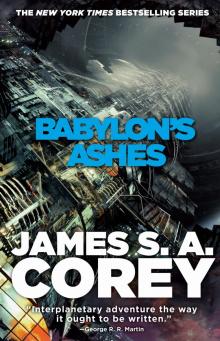 Babylon's Ashes
Babylon's Ashes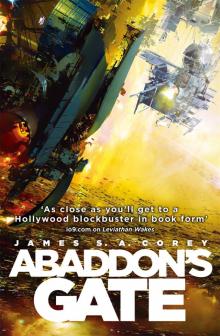 Expanse 03 - Abaddon’s Gate
Expanse 03 - Abaddon’s Gate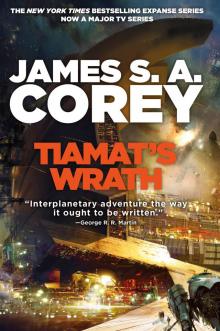 Tiamat's Wrath
Tiamat's Wrath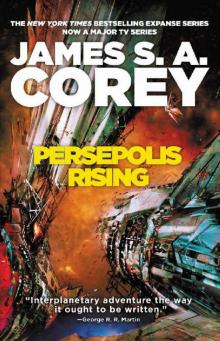 Persepolis Rising
Persepolis Rising The Butcher of Anderson Station
The Butcher of Anderson Station The Churn
The Churn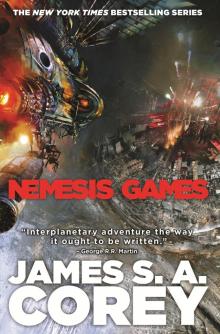 Expanse 05 - Nemesis Games
Expanse 05 - Nemesis Games Strange Dogs
Strange Dogs Honor Among Thieves: Star Wars
Honor Among Thieves: Star Wars Cibola Burn
Cibola Burn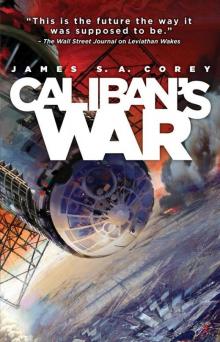 Caliban's War
Caliban's War The Vital Abyss
The Vital Abyss Auberon
Auberon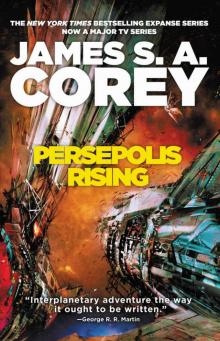 Persepolis Rising (The Expanse)
Persepolis Rising (The Expanse)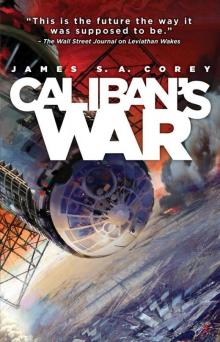 Caliban's War: Book Two of the Expanse series
Caliban's War: Book Two of the Expanse series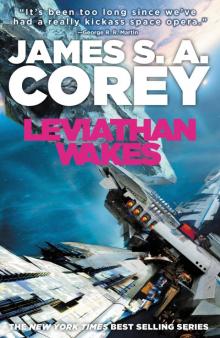 Leviathan Wakes: Book One of The Expanse
Leviathan Wakes: Book One of The Expanse Cibola Burn (Expanse)
Cibola Burn (Expanse) Strange Dogs (Expanse)
Strange Dogs (Expanse) The Vital Abyss: An Expanse Novella (The Expanse)
The Vital Abyss: An Expanse Novella (The Expanse) Leviathan Wakes e-1
Leviathan Wakes e-1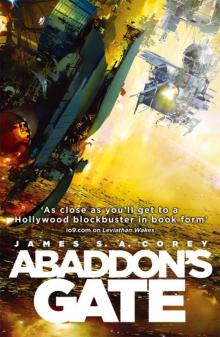 Abaddon's Gate e-3
Abaddon's Gate e-3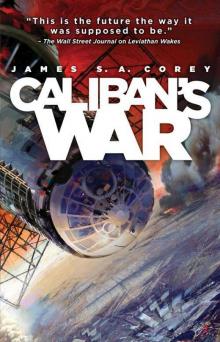 Caliban;s war e-2
Caliban;s war e-2 Gods of Risk: An Expanse Novella
Gods of Risk: An Expanse Novella Honor Among Thieves: Star Wars (Empire and Rebellion)
Honor Among Thieves: Star Wars (Empire and Rebellion)